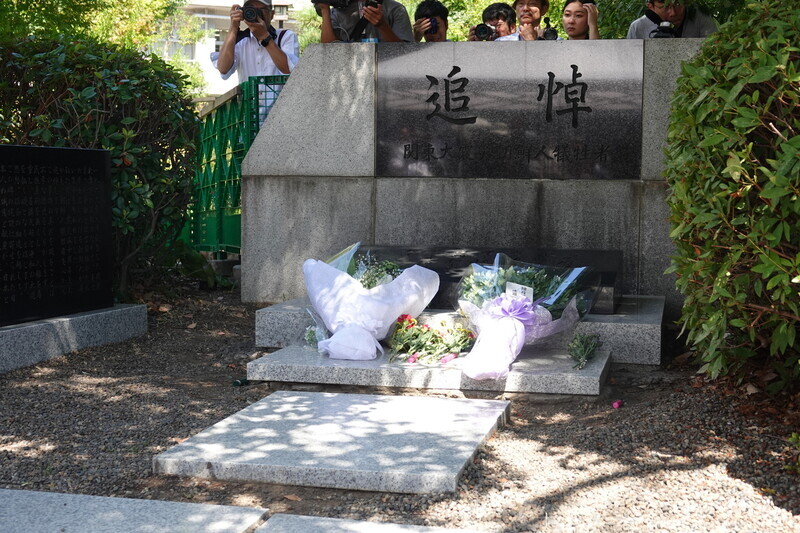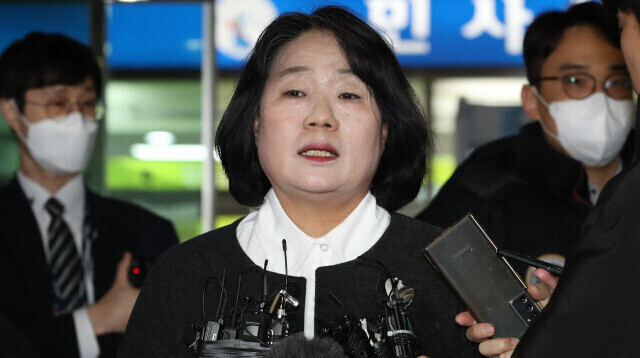hankyoreh
Links to other country sites 다른 나라 사이트 링크
Silent on Koreans massacred in Japan, Yoon targets independent lawmaker for mourning them
 at Yokoamicho Park in Tokyo, to Koreans killed in the massacres that occurred in the wake of the Great Kanto Earthquake in 1923, on Sept. 1. (Yonhap)" />
at Yokoamicho Park in Tokyo, to Koreans killed in the massacres that occurred in the wake of the Great Kanto Earthquake in 1923, on Sept. 1. (Yonhap)" />
Taking aim at independent lawmaker Yoon Mee-hyang for attending a memorial ceremony for massacred Koreans held by the General Association of Korean Residents in Japan — also known as Chongryon — in Tokyo, President Yoon Suk-yeol remarked that “anti-state acts” should be responded to “firmly.”
The government has launched a fact-finding investigation into whether Yoon Mee-hyang violated the Inter-Korean Exchange and Cooperation Act, while the People Power Party (PPP) filed a claim against the lawmaker to the National Assembly’s Special Committee on Ethics.
Faced with a declining approval rating due to the ideological war he has been waging, including his administration’s attempt to remove the bust of Gen. Hong Beom-do from the Korea Military Academy campus, the president, along with the ruling camp, is trying to turn the tide of public opinion by bashing Yoon Mee-hyang.
Meanwhile, critics are pointing out that the president, the government, and the ruling party are only focusing their energy on anti-communist offensives while staying silent on the massacre that targeted Koreans 100 years ago in the wake of the Great Kanto Earthquake and demanding neither an apology nor an expression of regret from the Japanese government.
While presiding over a meeting with senior presidential secretaries at the presidential office on Monday, Yoon Suk-yeol stated, “Anti-state acts aimed at shaking up and destroying our national political system of liberal democracy should be firmly responded to together with the public regardless of political affiliation,” taking aim at Yoon Mee-hyang, who attended a memorial ceremony for victims of the Kanto massacre organized by Chongryon on Friday.
“The Supreme Court of Korea previously ruled that Chongryon is an anti-state organization according to the National Security Act,” an official from the presidential office explained, adding that Yoon Mee-hyang’s attendance at a Chongryon event “is an issue that can greatly threaten constitutional values.”
Cabinet members joined in on the attack as well. While attending an account review meeting at the National Assembly, Foreign Minister Park Jin said, “An anti-state organization according to the National Security Act, Chongryon is a North Korean agency and has the characteristics of a North Korean mission in Japan. [. . .] At a time when the threat of North Korean nuclear weapons and missiles is growing, it is inappropriate for an incumbent lawmaker to attend a Chongryon event.”
Unification Minister Kim Yung-ho also commented, “Yoon Mee-hyang did not contact and report her plan to attend a Chongryon event to the Unification Ministry in advance,” adding that the lawmaker “violated the law as it stands.”

The Inter-Korean Exchange and Cooperation Act stipulates that any contact with North Koreans be declared to the Ministry of Unification beforehand. As members of overseas organizations who engage in activities according to North Korean policy are also considered North Korean, the ministry explained that contact with Chongryon is subject to the declaration requirement.
The ruling party also didn’t pull punches in criticizing Yoon Mee-hyang. On Friday, the PPP submitted a proposal to discipline the lawmaker to the National Assembly. During a party leadership meeting, PPP leader Kim Gi-hyeon called the independent lawmaker a “figure more suited as an officer of the Workers’ Party of Korea,” continuing that she “doesn’t deserve the post of lawmaker, let alone South Korean citizenship.”
In particular, Kim highlighted Yoon Mee-hyang’s relationship with the Democratic Party, pointing out her prior affiliation with the liberal opposition party and claiming that she is still in a “symbiotic relationship” with it.
“We ask that the Democratic Party consent to firm measures, including expulsion,” Kim said.
Allegations that Yoon Mee-hyang intentionally concealed the identity of the organizer of the memorial ceremony she attended even as she asked for cooperation from the National Assembly Secretariat regarding her business trip abroad are being raised as well, as her letter requesting cooperation from the National Assembly and the government ahead of her departure to Japan specified the Commemorative Projects Committee for the 100th Anniversary of Kanto Massacre — not Chongryon — as the event’s organizer.
“Posters for the event note Chongryon as its organizer, and nowhere on the posters could the name of the committee [Yoon Mee-hyang claimed as the event’s organizer] be found,” PPP lawmaker Ha Tae-keung argued, remarking that Yoon Mee-hyang went on a “phony business trip.”
Those who attended the memorial ceremony in question criticized the lack of historical consciousness in the government and the ruling party’s McCarthyist offensive.
“Not only Chongryon but also Japanese civil society have led efforts to commemorate the Kanto massacre for the past dozens of years,” said Lee Na-young, who chairs the Korean Council for Justice and Remembrance for the Issues of Military Sexual Slavery by Japan. “Even though the South Korean government remained silent, citizens of South Korea and Japan memorialized the victims in solidarity. [The Yoon Suk-yeol administration] is accusing all those who attended the event — including the bereaved family of Kanto massacre victims — of being forces colluding to overthrow our nation.”
An official from the Commemorative Projects Committee for the 100th Anniversary of Kanto Massacre added, “Even though the South Korea government didn’t put out a single message regarding the Kanto massacre in the 100 years since the incident, neither conducting an inquiry nor enacting a special law, overseas Koreans made considerable effort to get to the bottom of the massacre and commemorate it.”
“I don’t understand why [Yoon Mee-hyang’s] attendance at a longstanding commemorative event is being judged by ideological standards,” the official remarked.
The Great Kanto Earthquake was a temblor with a magnitude of 7.9 that struck the Kanto region that includes Tokyo on Sept. 1, 1923. At the time, the Japanese police spread rumors that Koreans started a riot, triggering their indiscriminate slaughter.
Neither the South Korean government nor the Japanese government has made proactive efforts to investigate the atrocity, and the Korean presidential office has never demanded an apology from Japan on the matter.
By Seo Young-ji, staff reporter; Kim Mi-na, staff reporter; Jang Ye-ji, staff reporter
Please direct questions or comments to [english@hani.co.kr]

Editorial・opinion
![[Correspondent’s column] The real reason the US is worried about Chinese ‘overcapacity’ [Correspondent’s column] The real reason the US is worried about Chinese ‘overcapacity’](https://flexible.img.hani.co.kr/flexible/normal/500/300/imgdb/original/2024/0510/5217153290112576.jpg) [Correspondent’s column] The real reason the US is worried about Chinese ‘overcapacity’
[Correspondent’s column] The real reason the US is worried about Chinese ‘overcapacity’![[Editorial] Yoon’s gesture at communication only highlights his reluctance to change [Editorial] Yoon’s gesture at communication only highlights his reluctance to change](https://flexible.img.hani.co.kr/flexible/normal/500/300/imgdb/original/2024/0510/7717153284590168.jpg) [Editorial] Yoon’s gesture at communication only highlights his reluctance to change
[Editorial] Yoon’s gesture at communication only highlights his reluctance to change- [Editorial] Perilous stakes of Trump’s rhetoric around US troop pullout from Korea
- [Guest essay] Preventing Korean Peninsula from becoming front line of new cold war
- [Column] The state is back — but is it in business?
- [Column] Life on our Trisolaris
- [Editorial] Penalties for airing allegations against Korea’s first lady endanger free press
- [Editorial] Yoon must halt procurement of SM-3 interceptor missiles
- [Guest essay] Maybe Korea’s rapid population decline is an opportunity, not a crisis
- [Column] Can Yoon steer diplomacy with Russia, China back on track?
Most viewed articles
- 1Korea likely to shave off 1 trillion won from Indonesia’s KF-21 contribution price tag
- 2Nuclear South Korea? The hidden implication of hints at US troop withdrawal
- 3[Editorial] Perilous stakes of Trump’s rhetoric around US troop pullout from Korea
- 4With Naver’s inside director at Line gone, buyout negotiations appear to be well underway
- 5In Yoon’s Korea, a government ‘of, by and for prosecutors,’ says civic group
- 6[Column] ‘Choson’: Is it time we start referring to N. Korea in its own terms?
- 7‘Free Palestine!’: Anti-war protest wave comes to Korean campuses
- 8How many more children like Hind Rajab must die by Israel’s hand?
- 9Overseeing ‘super-large’ rocket drill, Kim Jong-un calls for bolstered war deterrence
- 10[Photo] ‘End the genocide in Gaza’: Students in Korea join global anti-war protest wave